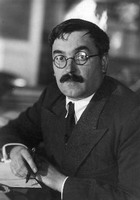Academician Vladimir A. Fock

Vladimir A. Fock
(1898-1974)
Vladimir A. Fock, one of the greatest theoretical physicists of the XX-th century, was born in 1898 in St. Petersburg. In 1922 he graduated from the Petrograd University and was kept at the University to prepare for professorship. Even before graduation Fock has published two scientific papers, one on the "old quantum theory" and the other on mathematical physics. During all his life he remained tightly bound up with the Physics Faculty and the Physics Institute of our University: in 1932 he became the head of the newly organized Quantum Mechanics Division, where he worked afterwards for almost 50 years.
Taking into account the outstanding scientific achievements of V.A. Fock, the Academy of Sciences of the USSR elected him as a correspondence member in 1932 and as an academician in 1939. He was awarded the highest scientific and public prizes.
The works of Fock are devoted to a wide range of problems of theoretical physics, among those are: quantum mechanics, quantum electrodynamics, quantum field theory, general relativity, mathematical physics (especially the diffraction theory). These works had deeply influenced modern development of theoretical and mathematical physics and won world-wide recognition. The results of his research have found reflection in such notions as: the famous Hartree-Fock and Dirac-Fock methods, developed for description of interacting fermions, e.g., electrons in atom; the Fock symmetry of the hydrogen atom, responsible for the extra degeneracy of the energy levels; the second-quantization method in the Fock space, fit for systems with variable number of particles; the method of Fock's functionals, which gives a new formulation of the quantum field theory; the Fock-Schwinger proper-time method, and others.
In his works on theoretical physics Fock not only had skillfully applied the advanced analytical and algebraic methods, but also had created new mathematical tools when the existing approaches were insufficient. His studies emphasized the principal significance of modern mathematical methods for theoretical physics, a fact that has become especially important nowadays.
In 1999, when the world physical community celebrated centenary of the outstanding theoretician Vladimir A. Fock, his name was given to the Physics Institute of the St. Petersburg State University. It is the name that will stay forever in the history of Science.